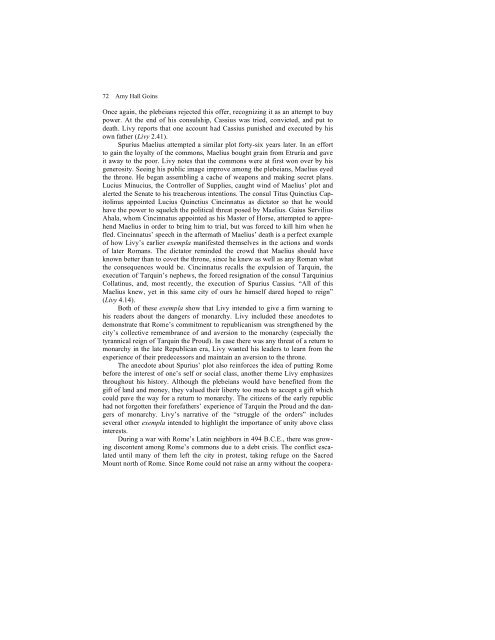Create successful ePaper yourself
Turn your PDF publications into a flip-book with our unique Google optimized e-Paper software.
72 Amy Hall Goins<br />
Once again, the plebeians rejected this offer, recognizing it as an attempt to buy<br />
power. At the end of his consulship, Cassius was tried, convicted, and put to<br />
death. Livy reports that one account had Cassius punished and executed by his<br />
own father (Livy 2.41).<br />
Spurius Maelius attempted a similar plot forty-six years later. In an effort<br />
to gain the loyalty of the commons, Maelius bought grain from Etruria and gave<br />
it away to the poor. Livy notes that the commons were at first won over by his<br />
generosity. Seeing his public image improve among the plebeians, Maelius eyed<br />
the throne. He began assembling a cache of weapons and making secret plans.<br />
Lucius Minucius, the Controller of Supplies, caught wind of Maelius’ plot and<br />
alerted the Senate to his treacherous intentions. The consul Titus Quinctius Capitolinus<br />
appointed Lucius Quinctius Cincinnatus as dictator so that he would<br />
have the power to squelch the political threat posed by Maelius. Gaius Servilius<br />
Ahala, whom Cincinnatus appointed as his Master of Horse, attempted to apprehend<br />
Maelius in order to bring him to trial, but was forced to kill him when he<br />
fled. Cincinnatus’ speech in the aftermath of Maelius’ death is a perfect example<br />
of how Livy’s earlier exempla manifested themselves in the actions and words<br />
of later Romans. The dictator reminded the crowd that Maelius should have<br />
known better than to covet the throne, since he knew as well as any Roman what<br />
the consequences would be. Cincinnatus recalls the expulsion of Tarquin, the<br />
execution of Tarquin’s nephews, the forced resignation of the consul Tarquinius<br />
Collatinus, and, most recently, the execution of Spurius Cassius. “All of this<br />
Maelius knew, yet in this same city of ours he himself dared hoped to reign”<br />
(Livy 4.14).<br />
Both of these exempla show that Livy intended to give a firm warning to<br />
his readers about the dangers of monarchy. Livy included these anecdotes to<br />
demonstrate that Rome’s commitment to republicanism was strengthened by the<br />
city’s collective remembrance of and aversion to the monarchy (especially the<br />
tyrannical reign of Tarquin the Proud). In case there was any threat of a return to<br />
monarchy in the late Republican era, Livy wanted his leaders to learn from the<br />
experience of their predecessors and maintain an aversion to the throne.<br />
The anecdote about Spurius’ plot also reinforces the idea of putting Rome<br />
before the interest of one’s self or social class, another theme Livy emphasizes<br />
throughout his history. Although the plebeians would have benefited from the<br />
gift of land and money, they valued their liberty too much to accept a gift which<br />
could pave the way for a return to monarchy. The citizens of the early republic<br />
had not forgotten their forefathers’ experience of Tarquin the Proud and the dangers<br />
of monarchy. Livy’s narrative of the “struggle of the orders” includes<br />
several other exempla intended to highlight the importance of unity above class<br />
interests.<br />
During a war with Rome’s Latin neighbors in 494 B.C.E., there was growing<br />
discontent among Rome’s commons due to a debt crisis. The conflict escalated<br />
until many of them left the city in protest, taking refuge on the Sacred<br />
Mount north of Rome. Since Rome could not raise an army without the coopera-

















